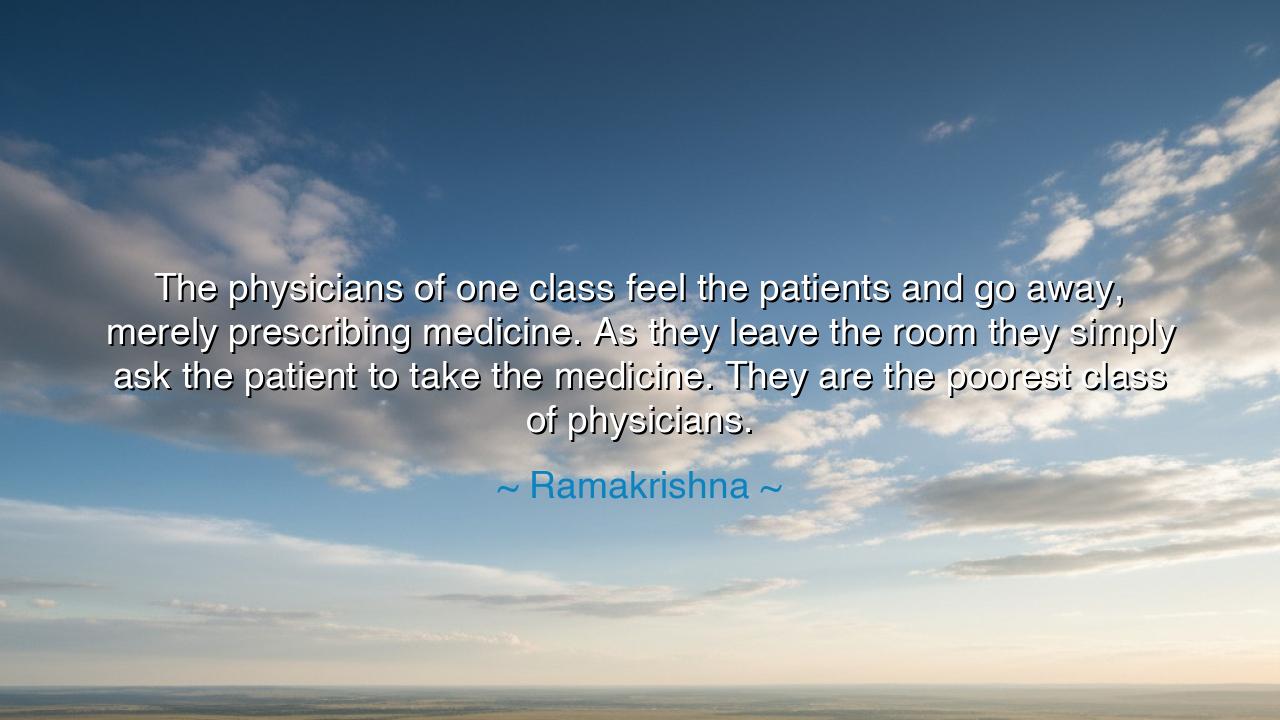
The physicians of one class feel the patients and go away, merely
The physicians of one class feel the patients and go away, merely prescribing medicine. As they leave the room they simply ask the patient to take the medicine. They are the poorest class of physicians.






Hear, O children of compassion, the words of the mystic Ramakrishna, who declared: “The physicians of one class feel the patients and go away, merely prescribing medicine. As they leave the room they simply ask the patient to take the medicine. They are the poorest class of physicians.” In these words, wrapped in simplicity, lies a profound teaching: healing is not found in medicine alone, but in presence, in empathy, in the touch of the heart. A physician who only prescribes without caring, who treats the body but not the soul, is poor indeed, though his shelves may overflow with remedies.
The origin of this saying is drawn from Ramakrishna’s way of teaching through parables. Though not a physician himself, he understood the ailments of the human spirit. He saw in the medical world a reflection of the greater truth of all life: that service without love is hollow, and action without compassion is incomplete. The “poorest class of physicians,” to him, symbolized those who fulfill duty outwardly but fail inwardly to connect with the humanity of those they serve. For a healer’s task is not only to prescribe medicine, but to kindle hope, to bring comfort, and to see the suffering soul behind the suffering body.
Consider, O listener, the story of Dr. Edward Jenner, the pioneer of the smallpox vaccine. He was not content merely to dispense medicine from a distance; he walked among the afflicted, listened to their cries, and offered himself as a servant of their healing. His medicine was powerful, yes, but so was his compassion, which allowed him to endure ridicule, danger, and doubt for the sake of his patients. Jenner was not of the “poorest class,” but of the noblest kind, for he lived the truth Ramakrishna spoke: the physician’s greatness lies in both skill and love.
Contrast this with the darker tales of history, when physicians became mere mechanics of the body, devoid of empathy. In certain wars and camps of cruelty, doctors experimented on the sick, reducing them to subjects rather than souls. They prescribed not for healing, but for curiosity or cruelty. Though they held great knowledge, they were truly the “poorest class of physicians,” for they had lost the essence of what makes medicine sacred: reverence for life itself.
This wisdom stretches beyond the realm of medicine. It speaks to every calling. The teacher who delivers lessons without caring for the student’s growth, the leader who issues commands without concern for the people’s well-being, the parent who provides food but not affection—all these mirror the same poverty of spirit. To fulfill one’s duty without love is to miss the deeper purpose of that duty. Ramakrishna teaches that true greatness in any field lies in combining action with compassion.
O children of tomorrow, learn from this counsel: be not content with half-hearted service. If you are to heal, then heal with presence as well as with medicine. If you are to lead, then lead with empathy as well as with wisdom. Do not be among the “poorest class” who merely do what is required and no more. Instead, let your heart shine through your hands, that those you serve may feel not only treated, but cherished.
Practically, this means cultivating presence in your daily life. When you speak to another, listen with your whole being. When you work, let compassion guide your choices. If you are a healer, sit with the patient, meet their eyes, and remind them they are more than their sickness. If you are not in medicine, apply this principle wherever you stand: do not only give the remedy, but also give the warmth of humanity.
Thus Ramakrishna’s words endure across the ages: “They are the poorest class of physicians.” Let us not be numbered among them. Let us be the richer kind—the healers, leaders, and servants who bring not only skill, but also love, not only remedies, but also hope. For in the end, it is not medicine alone that heals, but the union of science and compassion, of hand and heart, of action and love.






AAdministratorAdministrator
Welcome, honored guests. Please leave a comment, we will respond soon